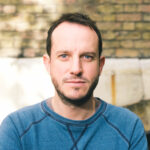Ethnographers are not time travelers, but we may be close. Our frameworks and methodologies develop a nuanced understanding of how relationships, processes, and objects evolve over time. This ‘temporal expertise’ is key to enacting our ethical responsibility to the past and future, says anthropologist Dr. Oliver Pattenden, who will explore these themes in his upcoming EPIC Talk on April 25, 2023: From Complex Histories to Possible Futures: Ethical Practice Across Time. In this Q&A, he discusses the intersection of ethnography, ethics, and time; how to encourage organizations to focus on ethics as a core component of decision-making, and what he’s learned from his three-year-old son lately. We hope you enjoy this rich conversation!
When people think about ethics, time probably isn’t the first thing that comes to mind. What inspired you to focus on time?
For me, it’s impossible to isolate ethics from time. When we think or act ethically – imagining the type of person we want to become, how we should respond to others, or the worlds we wish to create or avoid, for example – we project ourselves and others forwards in time while navigating ethical questions concerning responsibility, obligation, fairness, and justice, among other things. This is an act of cultural imagination that is based on our historical experiences. We’re dependent on the past while looking to the future. And, when we make ethical choices, we open certain futures, while some alternative futures never come to fruition – we close off ‘realisations of time’ just as we bring things into reality. Whether time is explicitly ‘on our minds’ when we think about ethics, we always project into the future, and, whether we realise it or not, to the past too.
What is the role of ethnography in understanding the past and considering the future?
My response to the first question about ethics and time cuts to classical ethnographic concerns. How do people make sense of their world and their place and potential place in it? How do people fashion and refashion relationships with others? How and why do some people follow the rules while others don’t? Why do some people get to make the rules while others have no say? Ethnography interrogates and unpacks these types of questions by addressing them through the intersubjectivity of human engagement. In other words, we attempt to understand the past and the future by sharing experiences with other people. Ethnography is also a temporal practice in its own right – we, ethnographers, flit forwards and backwards all the time as we create research objectives, wonder whether what we learnt yesterday is really the full story, and create and debate theories. The past and the future have roles in ethnographic practice.
What’s an example of how you have used “temporal expertise” in your own work?
In my PhD research I was keen to understand how historical ethical conflicts were influencing contemporary education and humanitarianism (both ethical future-facing projects) in South Africa and the UK. Unexpectedly, I went back into the historical record of colonialism to try to make sense of what I was seeing and hearing in two very different, but somehow very familiar, parts of the world. I’ve been doing a similar thing in my recent work on sustainability too – trying to understand why people wish to create or maintain particular human futures while disregarding the importance of others.
Anecdotally, it seems that recent layoffs in the tech industry have wiped out a lot of roles focused on ethics. It’s still seen as a “nice to have,” not a core business function or need. What’s your advice for getting organizations to embed ethics as a core function?
It might help if we stop thinking about ethics as a ‘thing’ that sits outside or to the side of what happens all day everywhere in every company in every industry. Ethics is core to every business, even when it’s not named or seen as such. Roles focused on ethics matter because they focus energy and attention on important questions, but ethics in industry is by no means caught up in these roles alone.
Which books, articles, or films have inspired you lately?
I’ve been reading a book about dinosaurs with my three-year-old son. He has learnt the names of dinos I never knew before and has some wonderful facts about them up his sleeve. Knowing I’m 40 next week, it’s pretty inspiring every time he teaches me something new in our conversations together.
What do you hope participants in your EPIC Talk will tell their colleagues about their experience? What do you hope they will glean?
I’d hope they’d say the session has made them think about their work differently, more thoughtfully perhaps or with a greater appreciation for the freedom we have to ‘be ethical’ even when our circumstances don’t appear to give us much of this freedom. If they glean some approaches that come to fruition as acts that improve other people’s lives that would be a phenomenal outcome too.
Join Oliver Pattenden’s workshop on April 25, 2023: “From Complex Histories to Possible Futures: Ethical Practice across Time.“
Featured image: New Year’s Shadow Sugoroku by Zeshin via National Diet Library Japan.


0 Comments